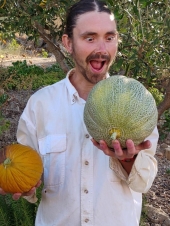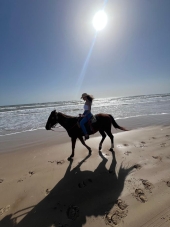
 3
3




Today is a very exciting time in my life. I am on a wonderful adventure and will never go through this particular experience again.
 3
3




Faren Leader wrote:**GROW YOUR HOMESTEAD SLOWLY.**
Don't overload yourself with so many projects that you burn out. Do NOT convince yourself that you're going to buy property, build a yurt to live in, get chickens, get ducks, get milking goats, plant a garden, plant fruit trees, install water catchment, etc etc etc all in the first year or two. Even if you already have badass food growing skills, don't plan on growing/raising/canning/storing more than about half your calories in the first year or two.
 1
1




Today is a very exciting time in my life. I am on a wonderful adventure and will never go through this particular experience again.
 2
2




Faren Leader wrote:If you keep them watered, and maybe give them a little shot of nitrogen (I favor diluted fish emulsion, or diluted urine) soon, you'll get big beautiful scallions that might bulb out a little bit at the bottom in May. Nothing wrong with that! Maybe plant something tall next to them soon (corn, tomatoes, whatever) in a direction that will give the onions some afternoon shade into June and July, and you can slowly harvest the onions as you need them.
 4
4




 3
3






 4
4




Some places need to be wild
 3
3




 7
7




 6
6




Visit Redhawk's soil series: https://permies.com/wiki/redhawk-soil
How permies.com works: https://permies.com/wiki/34193/permies-works-links-threads
 3
3




Invasive plants are Earth's way of insisting we notice her medicines. Stephen Herrod Buhner
Everyone learns what works by learning what doesn't work. Stephen Herrod Buhner

 11
11




How Permies works: https://permies.com/wiki/34193/permies-works-links-threads
My projects on Skye: The tree field, Growing and landracing, perennial polycultures, "Don't dream it - be it! "
 21
21






 8
8




I want to be 15 again …so I can ruin my life differently.
 15
15




Determining the difference between Bockings 4 and 14 is done by consensus. It's like trying to identify the difference between twins.
"There are other spots on the web to get my fix proving someone is an idiot but no other place for what I get here." -- former permie Brice Moss, 2012.
 12
12




 11
11




 13
13




 4
4




Gary Numan wrote:I wish I had known ... to start planting trees. Immediately. And don't stop.
I moved to this present farm in 2010, and planted ... I think all of *six* trees the first eight years here. The four that made it, all look very nice, wish I had 40 instead of just the four.
Plant trees.
 6
6




Peasants slept on beds of straw, while Emperors slept on beds of hulls.
www.OpenYourEyesBedding.com
 3
3




Lynne Cim wrote:
We also tried a dozen different deer fence configurations that all failed. Long thin garden plots was the answer in the end. Our small kitchen garden is just 7' X 30' with one raised berm down the middle - we simply planted on top of a pile of felled trees and cut branches topped with soil as our raised bed. Deer won't jump a fence if the back fence looks too close or if they feel that after the jump that they will be trapped in and not have room to jump back out. If only we had figured this out sooner.
 1
1




Paul Young wrote:
Should one be inclined to have an odd looking fence, research has shown that deer won't jump over a 5 foot fence IF the fence is installed at an angle of 55°. As stated in the quote, they want to know what is on each side of any vertical obstacle they plan to jump. I am always amazed at how an animal as big as an elk is, can just seem to spring over a 5 foot fence. When elk started jumping a section of our fenced garden that was about 6 feet high, the rest is higher, I dumped a lot of larger plastic pots along the inside of the fence. This landing spot uncertainty was enough to deter them until I raised the fence.
Peasants slept on beds of straw, while Emperors slept on beds of hulls.
www.OpenYourEyesBedding.com
 1
1




 2
2




Pictures I've seen always had it pointing out towards the jumping animal. A search for images will likely give you a number of options. For me, I would go for the "vertical fence with a brace coming out at about 4 ft high with several wires on the brace" version. This way I can access under the fence for management - otherwise Himalayan Blackberry would invade and I'd have no way to discourage it. Also, our soil gets sooo... soggy in the winter, I would worry about a 55° fence gradually sinking to a lower angle. One's exact ecosystem is a factor with choosing designs!Lynne Cim wrote: Oh very cool note about the garden containers! I wonder which direction would be best for the fence to be angled, in toward the planted area or out toward the approaching / jumping animal?
Visit Redhawk's soil series: https://permies.com/wiki/redhawk-soil
How permies.com works: https://permies.com/wiki/34193/permies-works-links-threads
 6
6




Living a life that requires no vacation.
 3
3




 5
5




Abraham Palma wrote:I think most of my failures were needed so I can grow.
Abraham Palma wrote:
- Waiting until the soil is moist before digging.
Abraham Palma wrote:
- Thistles are annoying but edible. Some are even tasty.
Abraham Palma wrote:
- If I refuse to do some work, the ecosystem evolves to adapt to the work I do. This involves losing some species, and living with the ones who thrive on my inputs. For example, if I don't figth bugs, some plants die, but predators appear. If I don't irrigate, some plants dry, but some others propagate with ease (like tasty thistle). This works for everything in life!! Given enough diversity, do just what makes you happy and the world around you will evolve to adapt for it.
 2
2




Dennis Coyle wrote:
It'd be great also to have an understanding of your circumstances as well! Like, what are you doing? what's the kind of area you're living in?
Anything to help out someone who hasn't quite put an idea together of what to do, or how to do it. What's something you wish you had known?
You should never forget that every creature has its purpose in the cycle of nature and can also be very important to humans. Sepp Holzer's Permaculture
 4
4





 4
4














 3
3




Some places need to be wild
 4
4




Douglas Alpenstock wrote:I wish I had known ... that Life will keep moving the goalposts. In all your planning and efforts, always consider resilience, adaptability, and readiness for change. For change will come.
“The most important decision we make is whether we believe we live in a friendly or hostile universe.”― Albert Einstein
 4
4




Living a life that requires no vacation.
 2
2




What kind of thistles are you eating and how are you eating them?
 9
9




Lorinne Anderson: Specializing in sick, injured, orphaned and problem wildlife for over 20 years.




Paul Young wrote:
Gary Numan wrote:I wish I had known ... to start planting trees. Immediately. And don't stop.
I moved to this present farm in 2010, and planted ... I think all of *six* trees the first eight years here. The four that made it, all look very nice, wish I had 40 instead of just the four.
Plant trees.
Totally, absolutely, undoubtedly sound advice. 15+ years after moving to 15 acres of barren pasture land (llamas) surrounded by timberland, one of my biggest regrets is not planting more trees sooner. By now, I've planted over 400 trees including about 150 fruit trees and I still continue to plant more. Sure, we can't eat all the fruit, but friends, the foodbank, and the wildlife take care of it all (no llamas). Elk and beavers have taken their toll on the trees, and I have to cage all the fruit trees while they're small (trunks of all permanently for the beaver), but it's worth the effort for food, firewood, and watching the wildlife.
 1
1




Paul Young wrote:Like you, Stacy, I would not use a 55° angled fence - too many cons, including all those you mentioned. I spend a lot of time removing blackberries without having to deal with a 55° fence. For the elk, people tell me to get a dog or shoot them. I won't do either because 1) they were here before me, and 2) I enjoy watching them. I chose to take the effort required to protect (not always successfully) individual trees and other plants scattered across the property. For most, protection from elk is only until the trees is big enough, except for 6' of the trunk they like to debark with their antlers - and then there are the beavers, too. The elk, standing on their back legs, can readily reach, and break, branches up to 8' to 10' so a fruit tree needs fairly long term protection.
Back to the original topic - you can't go wrong by planting trees as soon as you can, lots of them.
 2
2





| I agree. Here's the link: http://stoves2.com |






